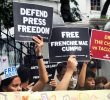Rey Claro Casambre, Philippine Peace Center
17 June 2016
Regardless of its outcome, by the mere fact of its being held, the preliminary or exploratory talks in Oslo between the incoming GPH peace negotiating panel and the NDFP panel last June 14-15 has already earned a distinction of its own in the long history of the GPH-NDFP peace negotiations.
Never before, since GRP(GPH)-NDFP negotiations started with the signing of The Hague Joint Declaration in 1992, had a newly-elected President ever initiated peace talks before even assuming office. Only once, in 1998, had an incumbent GRP President met with a ranking NDFP official (President Ramos received NDFP Negotiating Panel Chair Luis Jalandoni in Malacanang in January 1998). Weeks before his inauguration, prospective President Rodrigo Duterte made another unexpected and unprecedented move when he warmly received an emissary sent by the NDFP to personally congratulate him and discuss concrete proposals that could lead to the resumption of formal peace talks as well as other areas of cooperation.
The President-elect then promptly formed his negotiating team that would meet the NDFP negotiating panel in Oslo for preliminary or exploratory talks. That these talks materialized less than a month after the first meeting of the NDFP emissary and the incoming President unmistakably indicates a never-before-seen reservoir of mutual trust, goodwill and understanding. It also speaks of a political will to pursue peace talks in earnest that has been woefully absent under previous administrations. As all peace advocates, political observers and negotiators in general know, these are the very elements essential to the progress and success of any negotiation.
As expected, the exploratory talks resulted in an agreement, signed by both Parties and witnessed by the Third Party Facilitator, on the following:
1. The resumption of formal peace talks in accordance with previously signed agreements
2. The agenda for the formal talks will be:
a) Affirmation of previously signed agreements,
b) Process for accelerating negotiations including the timeline for completing the remaining items on the substantive agenda – SER, PCR, EoHDF
c) Reconstitution of the JASIG list
d) Amnesty Proclamation for the release of political prisoners
e) Mode of interim ceasefire
3. The GPH panel will recommend to President Duterte
a) the immediate release of NDFP consultants and other JASIG-protected persons to enable them to participate in the peace negotiations, and
b) the immediate release of prisoners/detainees on humanitarian grounds, such as the elderly and sickly.
Those familiar with the history – the ups and downs – of the peace talks over the years, especially the last ten or fifteen, would easily recognize these items agreed upon as precisely the very same issues that had caused the suspensions and impasses in the negotiations. Thus, these agreements and the forthcoming talks that they usher in with the abovementioned agenda constitute a significant breakthrough with a potential of carrying the talks forward to discussions on socio-economic reforms, the meat of the peace negotiations.
The relative ease with which these agreements were reached makes one wonder why the negotiations had been stalled or broken down over these same issues through the years. For the past 18 years since the CARHRIHL was signed and draft proposals for CASER were exchanged by the two Parties in 1998, only five formal talks had been held under three administrations (none under Estrada, four under Arroyo, one under BS Aquino). Clearly, the subjective factor, the political will of the GRP/GPH President to pursue peace talks in earnest, becomes the decisive element.
Political will and acumen would also be decisive in resolving the issues around the implementation of JASIG, the release of political prisoners through an Amnesty Proclamation and the mode of interim ceasefire. In the first case, the legal impediments to a release of detained consultants can be easily resolved through longstanding mechanisms to be set in motion by the DOJ upon the GPH President’s instructions. The Amnesty Proclamation, on the other hand, requires Congressional approval which the President at this early stage should have no difficulty in mustering, what with the usual en-masse defections to his majority party. While at first look the ceasefire appears to be the most complicated and potentially intractable and contentious issue, it would in fact turn out to be the least troublesome, provided the President effectively and judiciously wields his power and leadership as Commander-in-Chief of the state security forces.
An early resolution of the abovementioned issues would go a long way in generating an atmosphere conducive to holding formal peace talks on the next item on the substantive agenda, social and economic reforms. But this is not to say that it will be smooth sailing from there on.
Political will, mutual trust, goodwill and understanding are all necessary to bring the two Parties together and forge agreements to proceed with the negotiations and to stay the course, jointly seek ways to overcome obstacles and resolve impasses when these arise. But these are not sufficient, they do not guarantee that agreements would easily be reached that would address the roots of the armed conflict and pave the way to peace. Even assuming there is a healthy reserve of mutual trust, goodwill and understanding, the Parties would have to contend, perhaps more than with each other, with the powerful forces and influences of reaction that oppose any meaningful or substantial reform in the system. These include the big landlords and big comprador-bourgeoisie, the big bureaucrat-capitalists under the baton of US imperialism and other foreign capital.
This is the main obstacle in crafting the Comprehensive Agreement on Social and Economic Reforms. For reasons we can only venture to speculate on at the moment, past GPH panels have been unable to update, revise or even completely recast their 1998 CASER proposal despite reports at attempts to produce a new version for the formal talks in view of the changed global and domestic economic situation. This unpreparedness for serious negotiations on CASER is undoubtedly one of the major factors in the GPH’s past resistance to resuming the formal talks. The GPH has even come to the point of declaring, “We no longer want to talk about the social causes of the armed conflict. We can talk and talk for fifty years and not reach an agreement…”
There are no signs as yet that the incoming Duterte administration will take such a position. On the contrary, President-elect Duterte’s pronouncements and actions before, during and after the presidential campaign indicate he is indeed of a different mold from his predecessors. He is certainly closer to the ordinary tao, especially the poor, more sensitive to their situation and needs and avowedly more biased in their favor. Moreover, he has acquired a reputation for beating the odds.
The prospects for peace at this point will be determined, to a significant extent, on how much of this will translate into forging with the NDFP an agreement on social and economic reforms.





![[ANALYSIS] A different drug war](https://davaotoday.com/wp-content/uploads/2024/09/1000019103-110x100.png)




